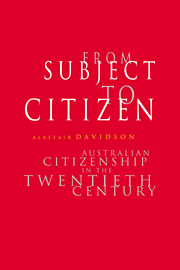Book contents
- Frontmatter
- Contents
- List of Figures
- List of Tables
- Acknowledgments
- Abbreviations
- Introduction
- PART I From Subject to Citizen 1901–1996
- Part II Discourses of Exclusion
- 5 Discourses of Exclusion, Silencing the Migrant Voice
- 6 Aborigines and Citizenship: Discourses of Exclusion
- Part III The Active Citizen and Beyond
- Conclusion
- Notes
- Select Bibliography
- Index
6 - Aborigines and Citizenship: Discourses of Exclusion
Published online by Cambridge University Press: 06 January 2010
- Frontmatter
- Contents
- List of Figures
- List of Tables
- Acknowledgments
- Abbreviations
- Introduction
- PART I From Subject to Citizen 1901–1996
- Part II Discourses of Exclusion
- 5 Discourses of Exclusion, Silencing the Migrant Voice
- 6 Aborigines and Citizenship: Discourses of Exclusion
- Part III The Active Citizen and Beyond
- Conclusion
- Notes
- Select Bibliography
- Index
Summary
Let us never forget that Australia's real test as far as the rest of the world, and particularly our region, is concerned is the role we create for our own Aborigines. In this sense, and it is a very real sense, the Aborigines are our true link with our region. More than any foreign aid program, more than any international obligation which we meet or forfeit, more than any part we may play in any treaty, agreement or alliance, Australia's treatment of her Aboriginal people will be the thing upon which the rest of the world will judge Australia and Australians … not just now, but in the greater perspective of history … the Aborigines are a responsibility we cannot escape, cannot share, cannot shuffle off; the world will not let us forget that.
Gough Whitlam, Leader of the Opposition, 1971The Aborigine became a displaced person in his own country. His apathy is his recognition of his stateless status. It cloaks … the bitter resentment of displaced people the world over.
Mavis Thorpe Clark, Pastor DougMake us neighbours, not fringe dwellers: Make us mates, not poor relations. Citizens, not serfs on stations.
Oodjaroo Noonuccal (Kath Walker), ‘The Aboriginal Charter of Rights’, My People, (Jacaranda, Brisbane), p. 33The rules of nationality and citizenship in Australia have always been more discriminatory against Aborigines than against any other part of the population. The attempts of the Aboriginal people to meet what was required of them to become citizens by an Anglo-Celtic nation were doomed to failure because those requirements were impossible to meet.
- Type
- Chapter
- Information
- From Subject to CitizenAustralian Citizenship in the Twentieth Century, pp. 188 - 216Publisher: Cambridge University PressPrint publication year: 1997



